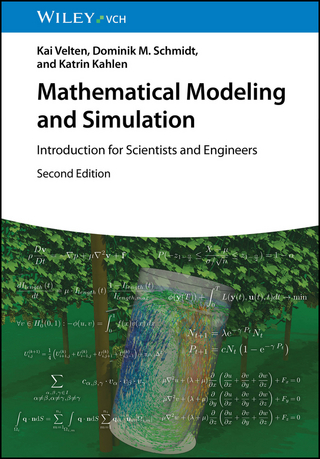Ideas in Chemistry and Molecular Sciences
Wiley-VCH (Verlag)
978-3-527-32543-6 (ISBN)
- Titel ist leider vergriffen;
keine Neuauflage - Artikel merken
Bruno Pignataro, born in Bologna in 1972, is Professor of Physical Chemistry at the University of Palermo. He received his degree in chemistry in 1995 from the University of Catania and his PhD in materials science five years later. He has helped establish a wide network of international collaborations and organized more than 10 meetings at national and international level, including coordinating the Young Chemists Group of the Italian Chemical Society and chairing the first editions of the European Young Chemist Award. He is a referee for several leading chemistry and materials journals, has more than 70 scientific publications and some 90 conference communications to his name, along with several invited lectures. Professor Pignataro's research interests focus on the related fields of the physical chemistry of molecular surfaces and soft nanotechnologies.
Preface
PART I: Preparation of New Materials and Nanomaterials
SELF-ASSEMBLING CYCLIC PEPTIDE-BASED NANOMATERIALS
Introduction
Types of Self-Assembling Cyclic Peptide Nanotubes
Applications of Cyclic Peptide Nanotubes
Nanotubular Assemblies from Cyclic Alpha, Gamma-Peptides
Summary and Outlook
DESIGNER NANOMATERIALS FOR THE PRODUCTION OF ENERGY AND HIGH VALUE-ADDED CHEMICALS
Introduction
State of the Art in the Preparation of Designer Nanomaterials for the Production of Energy and Chemicals
Highlights of Own Research
Future Prospects
Conclusions
SUPRAMOLECULAR RECEPTORS FOR FULLERENES
Introduction
Classic Receptors for Fullerenes Based on Curved Recognizing Units
Receptors for Fullerenes Based on Planar Recognizing
Concave Receptors for Fullerenes
Concave Electroactive Receptors for Fullerenes
Conclusions and Future Perspectives
CLICK CHEMISTRY: A QUOTE FOR FUNCTION
Introduction
New Applications in Materials Synthesis
Perspective
SUPRAMOLECULAR INTERACTIONS AND SMART MATERIALS: C-X ... X'-M HALOGEN BONDS AND GAS SORPTION IN MOLECULAR SOLIDS
Introduction
Interactions Involving Halogens: Nucleophiles Versus Electrophiles
Combining Complementary Environments: C-X ... X'-M Halogen Bonds
Smart Materials for Gas Sorption
Conclusions
PART II: Innovative Characterization Methods
APPLICATION OF ADVANCED SOLID-STATE NMR TECHNIQUES TO THE CHARACTERIZATION OF NANOMATERIALS: A FOCUS ON INTERFACES AND STRUCTURE
Introduction
Solid-State NMR Tools
Nanocarbons
Nanoparticles
Quantum Dots
Self-Assembly
Mesostructured Materials
Study of Interfaces and Structure by Solid State NMR
Conclusions
NEW TOOLS FOR STRUCTURE ELUCIDATION IN THE GAS PHASE: IR SPECTROSCOPY OF BARE AND DOPED SILICON NANOPARTICLES
Introduction
Methods for Structural Investigation of Silicon Clusters
Infrared Multiple Photon Dissociation Spectroscopy
IR-Spectroscopy on Bare Silicon Cluster Cations
Chemical Probe Method for Endo- and Exohedrally Doped Silicon Clusters
IR-Spectroscopy on Exohedrally Doped Silicon Cluster Cations
Summary and Outlook
DIRECT OBSERVATION OF DYNAMIC SOLID-STATE PROCESSES WITH X-RAY DIFFRACTION
Introduction
The Basics: Principles, Applications, Advantages and Drawbacks of the X-Ray Photodiffraction Method
Steady-State X-Ray Photodiffraction: Examples
Time-Resolved X-Ray Photodiffraction: Representative Examples
Conclusions and Future Outlook
PART III: Understanding of Material Properties and Functions
UNDERSTANDING TRANSPORT IN MFI-TYPE ZEOLITES ON A MOLECULAR BASIS
Introduction
Experimental Section: Materials and Techniques
Surface and Intrapore Transport Studies in Zeolites
Future Opportunities for Research and Industrial Application
MODELING LAYERED-MINERAL ORGANIC INTERACTIONS
Introduction
Computer Simulation Techniques
Results
Conclusions and Future Work
PART IV: Materials and Applications in Advanced Devices
STATUS OF TECHNOLOGY AND PERSPECTIVES FOR PORTABLE APPLICATIONS OF DIRECT METHANOL FUEL CELLS
Introduction
Fundamental Aspects of Direct Methanol Fuel Cells
Current Status of DMFC Technology for Portable Power Sources Applications
Perspectives and Concluding Remarks
SEMICONDUCTOR BLOCK COPOLYMERS FOR PHOTOVOLTAIC APPLICATIONS
Introduction and History of Semiconductor Block Copolymers
Crystalline-Crystalline D-A Block Copolymers P3HT-b-PperAcr
Conclusions and Perspectives
SWITCHING-ON: THE COPPER AGE
Introduction
Optical Properties of Cu(I) Complexes
Old Systems for New Challenges
Summary
UNDERSTANDING SINGLE-MOLECULE MEGNETS ON SURFACE
Introduction
SMM for Dummies
The "Self-Assembling" Concept
Deposition of Magnetic Molecules
Assessing the Integrity of SMM on Surface
X-Ray Absorption and Magnetic Dichroism for SMM
Electronic Characterization of Monolayer of SMMs
Magnetism of SMMs Using XMCD
Perspectives
SCULPTING NANOMETRIC PATTERNS: THE TOP-DOWN APPROACH
Introduction
Production of Micro and Sub-Micro Patterns
Conclusions and Outlook
| Erscheint lt. Verlag | 24.3.2010 |
|---|---|
| Reihe/Serie | Ideas in Chemistry and Molecular Sciences |
| Sprache | englisch |
| Maße | 170 x 240 mm |
| Gewicht | 935 g |
| Themenwelt | Naturwissenschaften ► Chemie |
| Technik | |
| Schlagworte | Analytical Chemistry • Analytische Chemie • Chemie • Chemistry • Nanomaterial • Nanomaterialien • nanomaterials • Nanostrukturiertes Material • Nanotechnologie • nanotechnology • Organic Chemistry • Organische Chemie |
| ISBN-10 | 3-527-32543-3 / 3527325433 |
| ISBN-13 | 978-3-527-32543-6 / 9783527325436 |
| Zustand | Neuware |
| Informationen gemäß Produktsicherheitsverordnung (GPSR) | |
| Haben Sie eine Frage zum Produkt? |
aus dem Bereich




